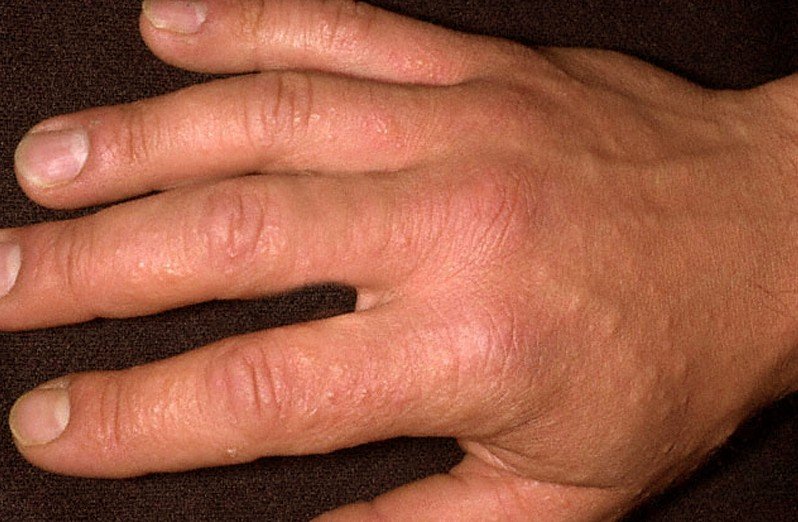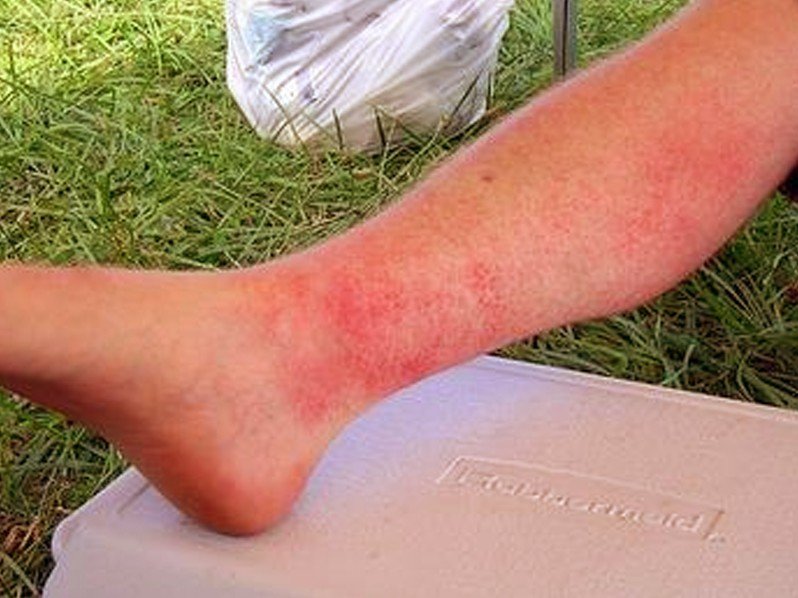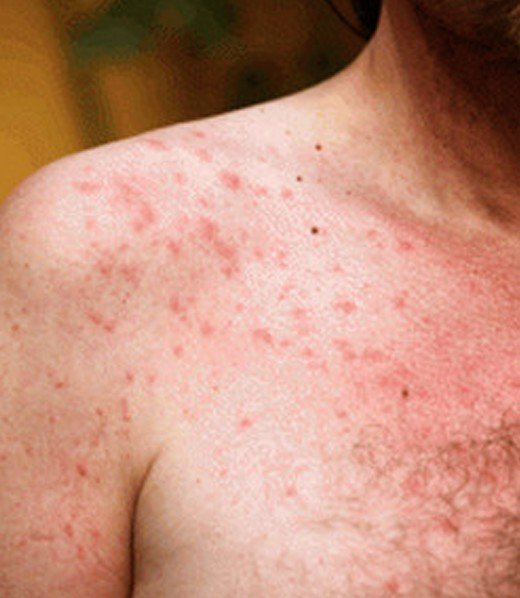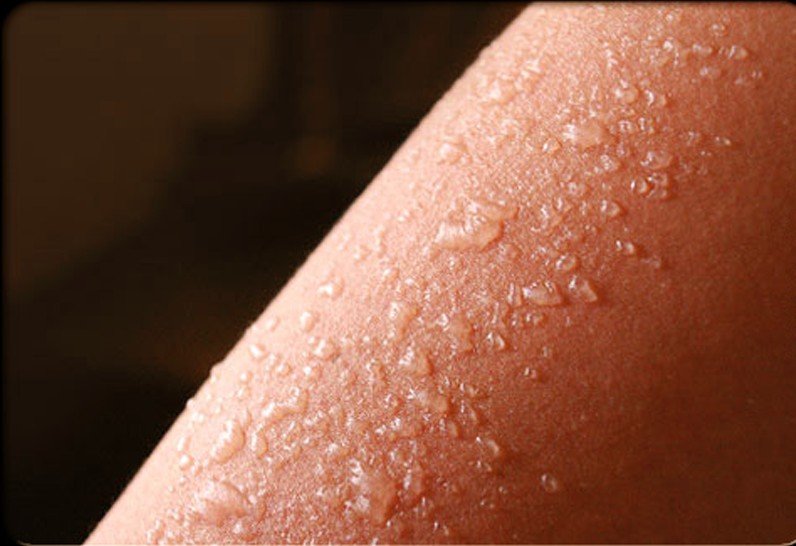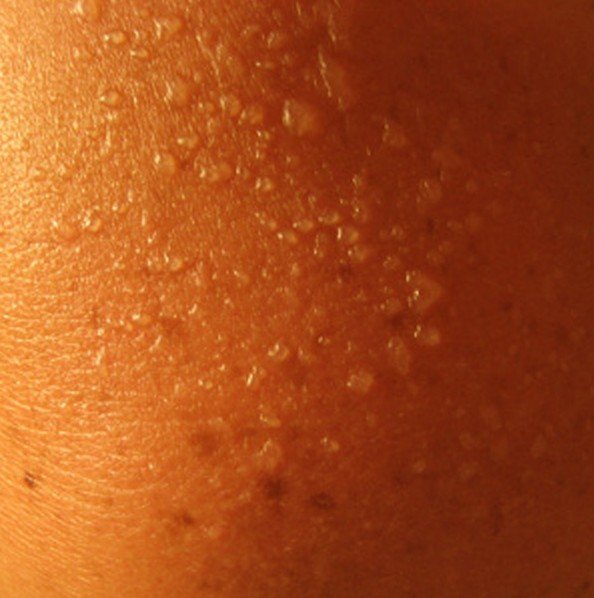Sun Poisoning
Last reviewed by Dr. Raj MD on January 12th, 2022.
What is Sun Poisoning?
This is your skin’s allergic reaction to being overexposed to the sun or the rays from tanning beds. In layman’s terms it is a severe type of sunburn. It is also called sun allergy. The medical terminology is Photodermatitis. People who are more susceptible to sun poisoning are the ones whose skin has low melanin content, which is the substance that give your hair and skin its color.
What does Sun poisoning look like?
When you get sun poisoning you develop a rash on your skin but can vary in what it looks like. What it looks like depends on how severe they symptoms are and what type you have. If it looks like a really bad sunburn it could be sun poisoning. Normally your skin will look very red, and your skin may peel or form little blisters. If you have solar urticaria, which is another type of sun poisoning you skin may also itch and then get red, and look like you have the hives. It can also look like eczema with scaly dry patches.
Symptoms
The symptoms of sun poisoning are from your skin’s immune system’s reaction to the UV rays of the sun. There are three different types of sun poisoning and each has their own set of symptoms.
Polymorphous light eruption
- Itchy rash (Itchy skin at night)
- On the sun-exposed areas of your body you may have small bumps
- There may also be a dense clump of bumps
- You may see on your chest, arms, and lower legs what appear to be hives
Solar urticaria
- Itchiness
- Skin becomes red
- Bumps that look like hives
- Dizziness
- Wheezing
- Loss of consciousness
Polymorphous light eruption – inherited
- Fatigue
- Headache
- Nausea
- Chills
General symptoms
- Reddening of your skin
- Tingling sensation
- Blisters
- Swelling
Severe Symptoms that will need immediate medical attention
- Fainting
- Upset stomach
- Dehydration
- Chills
- Headache
- Swelling in the face
- Blisters that may be painful and spread over a large area of your body
- Crusting or scaling
- Having a severe skin injury that can lead to bleeding
- Fever (fever wish rash atlas)
- Feeling confused
Causes
There are many different reasons that a person can get sun poisoning besides over exposure to the sun.
Absence of Pigmentation
If you are a person who has fair skin your skin does not have the pigmentation that your body needs to use as a protective barrier between the UV rays and your skin. Usually this happens to people with light colored eyes or blond or red hair/
Medications and other causes
There are certain medications that will increase your skin’s vulnerability to the UV rays of the sun. There could also be components in some antibacterial soaps or industrial cleaners that make your skin more vulnerable. Some of the medications that might cause you to be vulnerable to the UV rays are tranquilizers, blood pressure medication, and birth control pills.
It could also be from antifungal or sunscreens that contain PABA. These medications can even give a person skin rashes and burns without even being in the sun. Some antibiotics may put you at risk for sun poisoning so make sure that you read the information that comes with medication to see if it can cause sensitivity to the sun.
People who are not use to intense sunlight and then are exposed to it may cause sun poisoning. For example if you live in a northern climate and then go live or vacation in a climate in the tropics. This is polymorphous light eruption. Sun poisoning can also be caused by inheriting polymorphous light eruption, which happens in Native Americans.
Treatment
The effective sun poisoning treatment will depend on what caused your case of sun poisoning. When you first notice that your skin looks like you have a rash, have scaly patches, or swelling you should get out of the sun. Then you need to apply wet cool dressings to your skin to help soothe any irritation that might be from overexposure from the sun. You should also drink cool water but make sure that it is not ice cold because doing so can give your body a negative reaction. You want to make sure that you are reducing your body temperature so you can take a cool shower or sponge your body with cool water.
Solar urticaria sun poisoning is an allergic reaction so you may take an antihistamine to help improve your symptoms. If the cause is solar urticaria or polymorphous light eruption treatment may include steroids that you apply to your skin or sunscreen that states broad spectrum which will protect you from both UVB and UVA radiation.
You can take over-the-counter medication to help with any pain or itching that might result from sun poisoning. If you start to spike a temperature over one hundred two degrees, vomiting, or in extreme pain you need to seek immediate medical help.
Natural Home Remedies
If you need immediate relief from the burning rash and itchiness you can try:
- Making a solution of cool water and baking soda to form a paste which you apply over the areas where the rash and itching is.
- You can also apply calamine lotion to the itchy areas to reduce the itchiness
- Apply Aloe Vera to the sun poisoned area
- Make sure that you are using gentle soaps
- You can also take an oatmeal bath
If you have severe redness, itching, and pain your physician may prescribe corticosteroid creams to put on the areas to help relieve all three of these symptoms.
Sun Poisoning Pictures
Photos, Images and Pictures collection of Sun Poisoning Rash…
